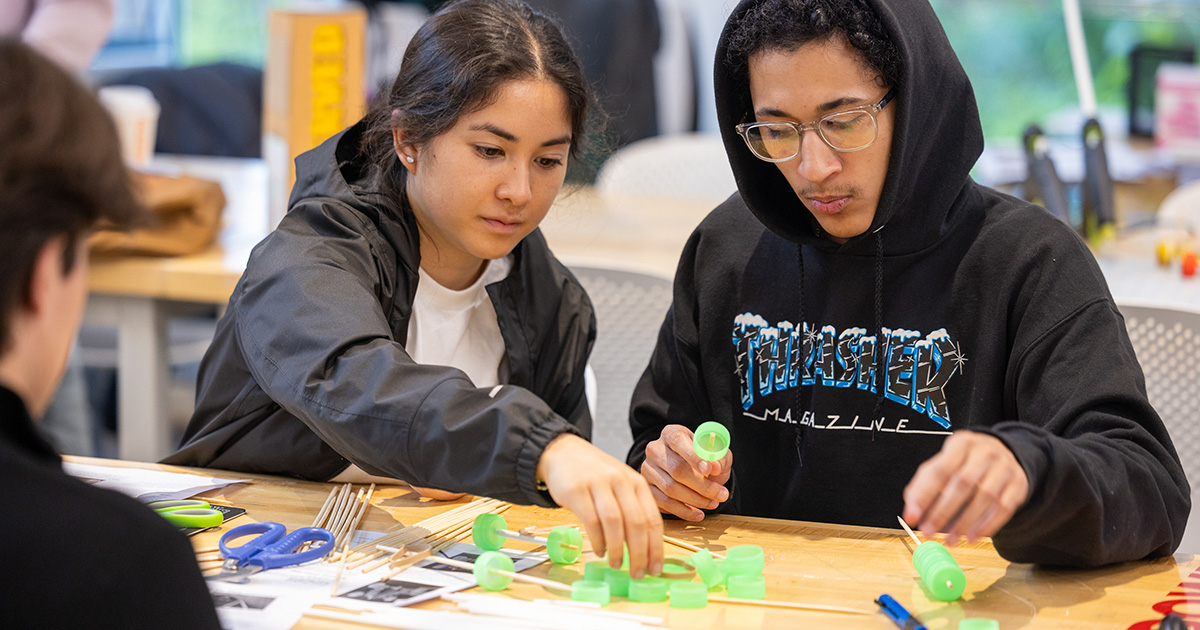Babson Global Scholar Grad Finds Hope, Safety After Ukraine Escape
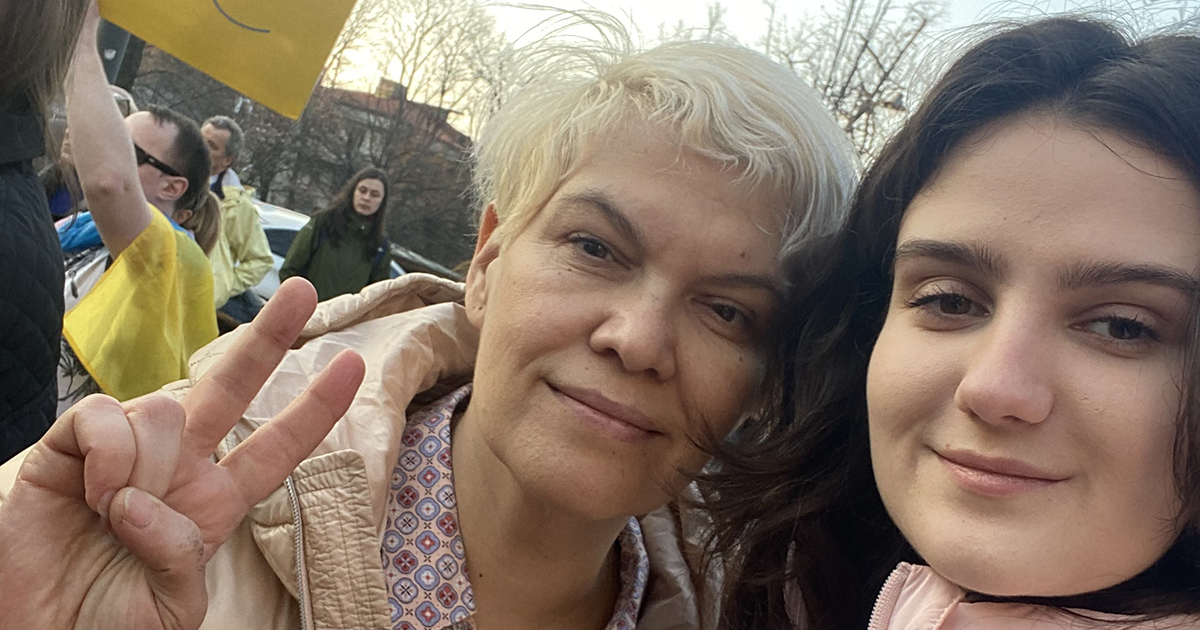
Anna Saltykova ’21, had been working at her dream job in Odesa, Ukraine, at the beginning of the year when persistent rumors of a large-scale Russian invasion of her country began to grow.
Ukraine and Russia had an ongoing war that had been simmering for at least a decade, but something felt different. She could see worry etched on faces throughout the city, as if Odesa had struck some kind of anxiety fault line. Then came the night of February 23.
“I remember I couldn’t fall asleep, which is unusual because generally I fall asleep right away. Then I kept on waking up in cycles, first at 1 a.m., then at 2, then at 3,” Saltykova said. Melatonin was no help. Saltykova was still tossing and turning when she heard her phone ping.
“I had turned off my notifications, but a message got through anyway,” Saltykova said. It was an alert from Russian President Vladimir Putin, announcing the start of what he called a “special military operation” in Ukraine.
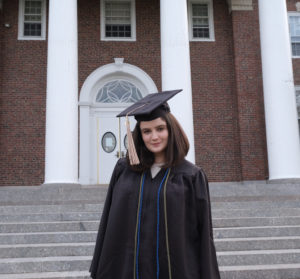
After graduating from Babson, Global Scholar Anna Saltykova ’21 was living and working Odesa, Ukraine.
Almost as soon as she read the message, Saltykova heard explosions. She grabbed her passport, tossed some necessities into a backpack and spent the next 13 days connecting with family and organizing a secure exit from the country for her and her mom, Olha. She eventually secured a sales job in Dublin, Ireland, that allowed Saltykova to bring her mother and let both move into employee housing.
Speaking about her ordeal roughly 100 days after it began, Saltykova wistfully described her life as a Babson College graduate living in Odesa before the war. The port city is known as the Miami of Ukraine, she said. Saltykova had a well-paying job that fit her career plan, as a capital fund investor charged with backing Ukrainian business proposals only. She was meeting exciting new friends, had her own studio apartment close to Odesa’s thriving nightlife, and was even taking figure skating lessons.
That life vanished with a text. Saltykova left it, along with her possessions, in the downtown Odesa rental. She closed the door and bought a bus ticket to join her family in central Ukraine.
Homeward Bound
The six-hour bus drive to Kropyvnytskyi, the city where Saltykova’s mother lived in central Ukraine, was uneventful. There were glimpses of the war to come, however.
“I saw a lot of military trains on the railroads as we were driving, and they were moving this huge equipment,” she said. “It’s one thing to see that stuff on the news, but when it’s right there … it just suddenly felt real.”
She spent 10 days in Kropyvnytskyi, most of the time in the basement of the nine-story apartment building where her mother lived. Residents turned it into a makeshift bomb shelter and tried to keep busy—volunteering, reading, and occasionally working remotely. Saltykova’s job disappeared when the war started; who’d want to invest in Ukrainian business developments now?
Saltykova pitched in where she could, but the dank, windowless shelter, the underlying fear and uncertainty, and the incessant air raid warnings took a toll.
“It starts to get to you. You lose a sense of reality and suddenly you don’t know what day it is or what time it is,” Saltykova said.
The closest explosion Saltykova experienced was when Russians bombed the Kropyvnytskyi airport about 30 miles away from her building. That was close enough.
“It was too much for me. I started talking to my mom about leaving,” she said. It wasn’t just the threat of death or serious injury that worried Saltykova. As the war dragged on, she worried that she and her mother would become increasingly vulnerable to attackers, looters, or worse. She had difficulty convincing her mother to leave, but within days she mapped out an exit plan.
Roughly 2 million Ukrainians fled the country in the first two weeks of the war, and Saltykova and her mother were among them. The Israeli Embassy was offering to drive refugees from Odesa to the neighboring country of Moldova. Saltykova reserved two seats and headed toward an uncertain future.
The Long Journey
The trip covered more than 700 miles, taking the mother-daughter duo from Kropyvnytskyi down to Odesa, then west to the Moldova border. They’d be vulnerable to air strikes on open railways and highways the whole time, despite sporadic cease-fire agreements with the Russians.
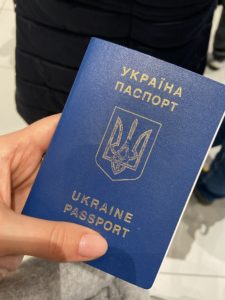
Of all of Anna Saltykova’s possessions, her Ukrainian passport was suddenly worth the most.
She and her mother waited in Kropyvnytskyi’s cold, pitch-black train station for eight hours because the train was leaving at 3 a.m. The city had a 6 p.m. curfew and switched the lights off in and around the train station to make it harder for Russian pilots to bomb the railways. The packed ride to Odesa was slow and halting, stopping every time bomb sirens went off, leaving riders to wonder whether they would be the next target.
Once the two women were safely on the bus to Moldova, they were told they’d have to cross the border on foot. Lines of trucks, cars, and buses that had hurried to cross the Ukrainian border now sat idle, many abandoned because they ran out of gas. The backup stretched nearly 10 miles from the border.
“I remember seeing this Porsche that was just left there. People had other priorities,” Saltykova said. She clutched her passport throughout the trip. It was her most important possession, her ticket out, the one thing that allowed her to leave Ukraine and get to safety.
Saltykova, who had worked with Babson’s Initiative on Human Trafficking and Modern Slavery, found that 10-mile walk to be the scariest part of her journey. She and her mother teamed up with another mother and her 5-year-old daughter to ensure safety in numbers, but she still shivers at the thought of the three-hour ordeal.
“With war, even if you don’t die from bombing or shelling or shooting, there’s a lot of crime and a lot of black things that can come out of this time of uncertainty,” Saltykova said.
Life During Wartime
Despite the ongoing war, Saltykova says she is incredibly lucky. Her degree and connections through Babson’s highly selective Global Scholars Program, which offers a four-year, full-tuition scholarship to a small number of students from around the world, made all the difference.
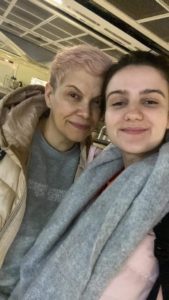
Anna Saltykova and her mother, Olha, at the airport in Dublin, Ireland. She and her mother escaped Ukraine as refugees and moved to Dublin after Russia’s invasion.
“I’m probably one of the most privileged Ukrainians. I didn’t see any military action. I left Ukraine intact. I had a place to go to, I secured another job, and I moved to Ireland,” Saltykova said. “If it wasn’t for this community, I wouldn’t have been able to bounce back as quickly.”
After she crossed into Moldova, Saltykova traveled to Bucharest, Romania, and stayed with a volunteer helping refugees for a few days. Several members of Babson’s staff and fellow Global Scholars, including Silvia Filova ’22, reached out to Saltykova and offered help, either financially or with job leads. In particular, Nikki Nicosia, assistant director of Babson’s international student and scholar services, was a huge help, Saltykova said.
Having a U.S. college degree in and of itself elevated Saltykova’s résumé. She interviewed for several jobs throughout Europe and settled on a sales position at Web Summit in Ireland, which provided housing for her and her mother.
Saltykova has no idea how long she will be living in Ireland, but she knows she can’t return home for at least another year. She tries not to spend too much time thinking about her former life in Odesa.
“It can be difficult. You might just want to lie in bed and reminisce that your life was amazing, and now you’re like a white sheet of paper,” she said. “But, I’m young and I have friends and my mom who supported me emotionally and showed me that there is a future, even when tragic events happen.”
Posted in Community

